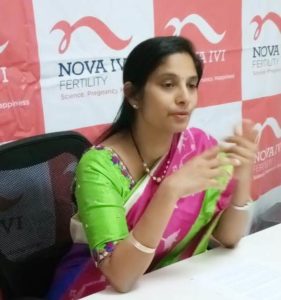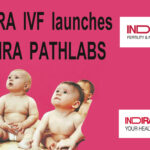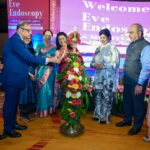How IVF is bringing joy to thousands of childless couples? IVF is a complex modern medical procedure and fertility treatments. IVF has been solution for several couples to achieve their dream of parenthood.
It has been 41 years since the birth of the world’s first IVF baby, Louise Brown. The day– July 24th, has since been observed as World IVF Day, inspiring and giving hope to millions of infertile couples of completing their family. Today, with the advancement of medical science and technology, the IVF industry has grown leaps and bounds, providing couples battling infertility with advanced treatment options and solutions.
India has nearly 10-15 per cent of married couples who suffer from the inability to conceive naturally. IVF has been the solution for several such couples, helping them achieve their dream of parenthood. IVF is a complex modern medical procedure and one of the most well known fertility treatments in practice today. The IVF process includes the artificial stimulation of the ovaries to produce multiple eggs, removal of the eggs from the ovary (egg retrieval), selection of healthy sperms, fertilization of the eggs in the laboratory, and subsequent placement of the resulting embryos into the uterus (embryo transfer). The evolution of Assisted Reproductive Technology has helped provide more safer and effective treatment options for couples who have been unable to conceive for different reasons.


Improvements in culture medium, equipment’s, laboratory controls and cryopreservation techniques have increased the success rates in assisted reproduction. Following are some of the global best practices in the IVF industry that have helped ensure better success rate:
Intracytoplasmic Sperm Injection (ICSI)
ICSI is a technique sometimes used with in vitro fertilisation (IVF) in which one sperm is injected directly into one egg in order to fertilise it. This is especially useful for men with very low sperm counts since ICSI ensures that the sperm reaches the egg directly rather than waiting for the sperm to naturally fertilise the egg. ICSI is currently the most successful treatment for male infertility, with fertilisation rates of 60%-70% depending on quality of the sperm used. In some cases, assisted hatching may be used to increase the chances of implantation.
Pre-implantation Genetic Testing – Aneuploidy and Monogenic Disorder
Genetic testing is divided into separate categories: Preimplantation Genetic Testing – Aneuploidy (PGT-A) and Preimplantation Genetic Diagnosis – Monogenic Disorder (PGT-M). All couples are at risk of having abnormal embryos. The risk increases significantly as a woman gets older. An abnormal embryo almost always fails to implant, or even if it does, the pregnancy ends in a biochemical pregnancy, miscarriage, foetal death later in pregnancy, stillbirth or a baby with abnormalities.
PGT-A is observed to improve the success rate of IVF by 15-20%. The test is used to determine the number of chromosomes in an embryo. The normal number of chromosomes in an embryo is 46 and any missing number is characterised as a defect. Once the embryo grows in the lab, it is usually biopsied on day 5, which is called the blastocyst stage. Then the number of chromosomes within each cell is counted in these embryos.
PGT-M helps fertile couples who have a history of genetic condition in their families or any condition for which the couple’s offspring are at risk. The technology helps in screening the embryos for specific genetic diseases and chromosomal disorders, for example, single gene disorders including cystic fibrosis and sickle cell Anemia. PGD can be used to identify approximately 2,000 inherited single gene disorders and is 98 percent accurate in identifying affected and unaffected embryos.
In a recent case, a 43 year old woman, also a corporate professional, approached for treatment. “When the patient visited, she reported suffering a miscarriage a year ago, post which she was unable to conceive. As part of her IVF procedure, we also recommended that she undergoes a Preimplantation Genetic Test – Aneuploidy. Through the test we found that only one out of the four embryos fertilized for the IVF cycle was normal. This embryo was used for implantation and resulted in a successful pregnancy and the birth of a healthy child. Advanced Assisted Reproductive techniques like this, gives hope to couples who have experienced repeated IVF failures, women who have late pregnancies, and couples who are carriers of genetic diseases.”
Other important ART techniques that help optimise clinical outcomes are:
Cryopreservation: Embryo cryopreservation is the process of freezing and storing embryos and is a part of most in vitro fertilization programs. The process is chosen for reasons as varied as providing an additional chance for pregnancy, or saving embryos in the face of certain medical treatments. There has been tremendous improvement in cryopreservation protocols, that has helped women undergoing cancer treatment or who wants to postpone having a baby.
Embryo or Blastocyst Culture: Blastocyst Culture is a technique in which an embryo is developed in the laboratory for 4-6 days after fertilization before being placed in womb. The embryo gains many cells as a result of being developed for so many days. The embryos developed for 4-6 days are much more advanced than the ones developed for just three days. This enables embryologists to select from the more advanced embryos with better potential for implantation. The biggest advantage of Blastocyst Culture method is that it significantly reduces the risk of multiple pregnancies.
Reproductive medicine has come a long way since the birth of the first IVF baby and the future looks bright. The research advances in this field will help in treating male and female infertility and fulfil the dreams of parenthood for many couples. The global best practices in IVF are being implemented in the Country and the Assisted Reproductive Techniques (ART) is bringing joy to thousands of childless couples and making India a preferred destination for fertility treatments.


Dr Saroja Koppala
Fertility Consultant
Nova IVI Fertility
Beside GVK One
Road No.1, Banjara Hills
Hyderabad – 500 082











